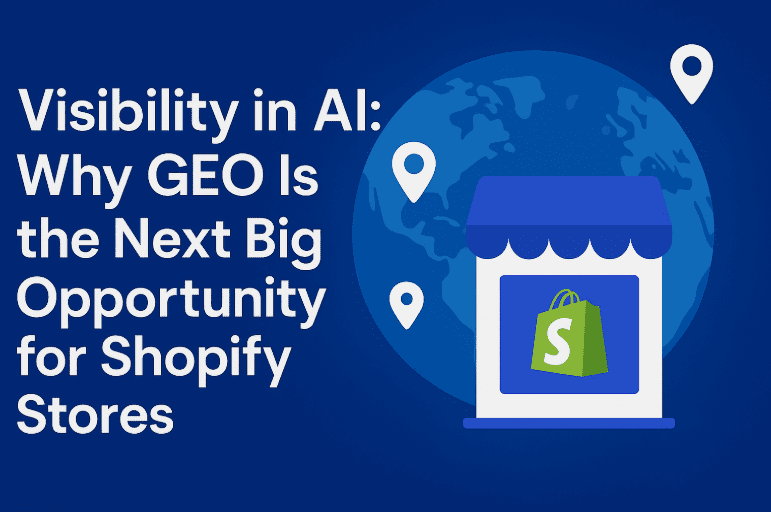Introduction
Shopify sellers have always relied on SEO, ads, and social media to drive growth. These channels still matter, but the way people find products online is changing fast. More shoppers are starting their journey with AI assistants like ChatGPT, Gemini, Claude, and Perplexity. Instead of typing search terms, they ask a question and expect an immediate answer.
This shift creates a new challenge. If your store is not part of those AI answers, you may never even be seen by potential customers. That is where visibility in AI comes in. To capture this opportunity, Shopify merchants need to understand a new practice: GEO, or Generative Engine Optimization.
1. What Is GEO and How Is It Different from SEO?
Most Shopify sellers are familiar with SEO. You optimize pages with keywords, backlinks, and structured data so search engines rank your store higher. GEO is different because it is built for AI, not for search engines.
AI assistants do not return a list of links. They produce direct answers, often blending information from many sources. That means the old strategy of chasing keyword rankings is not enough. To succeed with GEO, you need to make sure your product information is structured, clear, and accessible in a way AI models can understand and reuse.
Think of SEO as competing for spots on a results page, while GEO is about training AI to recognize your store as a reliable source of answers.
2. Why Visibility in AI Matters for Shopify Sellers
Imagine a customer asking an AI assistant: “What is the best rolling kitchen island for small apartments?” If your Shopify store sells a product that fits, you want that product to appear in the AI’s response. If it doesn’t, you miss the sale—even if you have the perfect solution.
This is the core of visibility in AI. AI tools are shaping buying decisions before shoppers ever visit Google or Amazon. Being invisible at that stage means your store is left out of the conversation.
For Shopify sellers, this also creates a first-mover advantage. GEO is still new, so competition is lower compared to SEO. Early adopters who invest in GEO can secure positions in AI answers before their competitors catch on.
3. Practical Steps to Build GEO Readiness
Getting ready for GEO does not require a complete overhaul of your store. Instead, it means adding a few smart practices that make your content AI-friendly.
- AI-ready sitemaps (llms.txt): Similar to a sitemap for Google, this file guides AI crawlers to the right pages on your Shopify store. It tells them which content is most relevant and should be included in answers.
- Structured product cards: Embedding product information in blogs or guides helps AI parse details like size, materials, and features. This makes your products easier to surface in responses.
- Content optimization: Existing blogs can be rewritten to better match how shoppers ask questions in natural language. Instead of focusing only on keywords, think about the specific problems or goals your customers have and address them directly.
These steps are not complicated, but together they can significantly improve your store’s presence in AI answers.
4. Inception Pages: Moving Beyond Optimization
ClickFrom.ai has introduced a new feature called Inception Pages, designed to push GEO even further. Unlike traditional optimization, which prepares your content to be found, Inception Pages aim to actively shape how AI assistants think about your products.
The idea is simple: uncover the hidden strengths of your products—qualities that customers love but may not be obvious in your standard description. These could come from reviews, use cases, or unique design details. An Inception Page highlights those strengths and connects them to real shopper needs.
For example, imagine a Shopify merchant selling a kitchen island. Standard descriptions may list size and materials. An Inception Page, however, could emphasize how the drop-leaf design makes it perfect for renters in small apartments, or how built-in outlets help modern families with multiple devices. This positions the product in a way that aligns directly with common questions shoppers ask AI assistants.
5. The Road Ahead for Shopify Stores
The rise of AI assistants signals a shift as big as the early days of SEO. In the near future, visibility in AI will matter as much as ranking on Google once did. GEO is the framework that helps Shopify sellers prepare for this new environment, and tools like Inception Pages make the process practical.
For Shopify merchants, the message is clear: adapting to GEO is not optional. By taking steps now—structuring content, adding AI-friendly sitemaps, and experimenting with Inception Pages—you can secure a place in the next wave of online discovery and position your store for long-term growth.



































